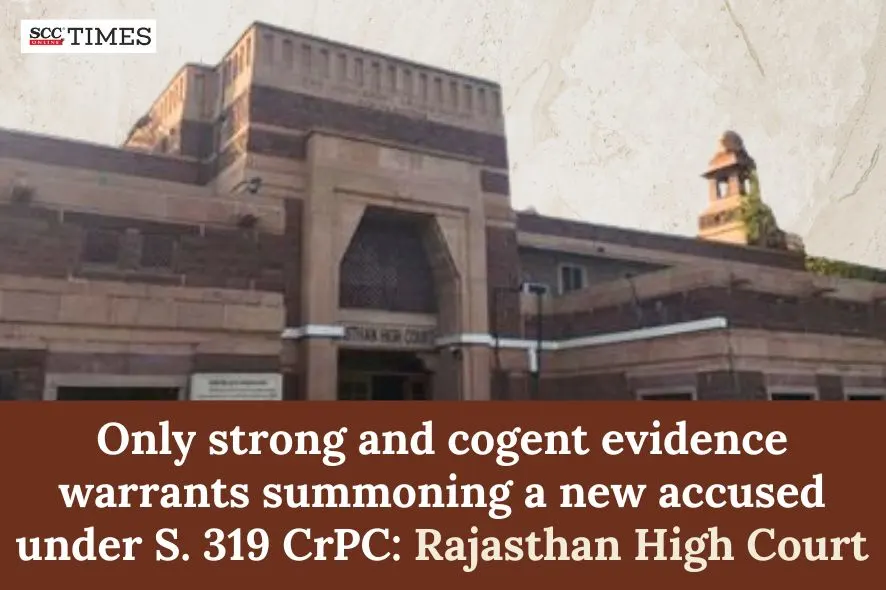Rajasthan High Court: In a criminal revision petition filed by the petitioner challenging the order of the Additional Sessions Judge, which rejected his application under Section 319 of the Code of Criminal Procedure, 1973 (‘CrPC’) for taking cognizance against the respondents, the Single-Judge Bench of Anoop Kumar Dhand, J., dismissed the petition holding that the powers under Section 319 of the CrPC are discretionary and extraordinary, to be exercised sparingly. The Court found no error in the Trial Court’s reasoning, particularly because the injured in his statement under Section 161 of the CrPC, had not named the respondents.
Background
On 07-09-2022, the respondents along with the two accused allegedly assaulted the injured and inflicted several injuries on his person. An FIR was registered with the Police Station for offences under Sections 143, 341, and 323 of the Penal Code, 1860 (‘IPC’).
The medical examination and X-Ray report of the injured revealed various fractures in the ribs. Upon completion of the investigation, the police filed a charge-sheet dated 08-12-2022 only against the two co-accused, for offences punishable under Sections 307, 323, 341 read with Section 34 of the IPC.
When the trial commenced against the co-accused persons, the statements of the injured, the complainant, and other eyewitnesses were recorded. The witnesses categorically levelled allegations against the accused which indicated their active participation in the incident, and thus, prima facie evidence was available against them. Consequently, the petitioner submitted an application under Section 319 CrPC for taking cognizance against the respondents, which was rejected by the Trial Court on 28-07-2025. Aggrieved by this rejection, the petitioner filed the criminal revision petition.
Analysis and Decision
The Court noted that a perusal of the statement of the injured, recorded during investigation under Section 161 CrPC, clearly indicated that the respondents have not even been named assailants. The names of only two accused were recorded, against whom allegations were levelled. The injury report of injured also indicates that he suffered only two injuries, including fractures of certain ribs.
The Court observed that considering the overall facts and circumstances of the case, the charge sheet was submitted against only the two accused persons who were named in the statement of the injured. The Court noted that,
“When the injured is silent about the involvement and role of the accused-respondents, then under these circumstances, the statements of other witnesses hardly make any difference.”
The Court reiterated that the powers contained under Section 319 of the CrPC are discretionary in nature, and the discretion exercised by the Trial Court cannot be lightly interfered with unless it is shown that the order refusing to implead the persons as accused has been made mechanically or it is arbitrary or perverse. The Court emphasized that the Trial Court, while refusing to take cognizance against the respondents, considered every aspect of the matter and the entire material placed before it, and more particularly, the chance of conviction of the respondents who were sought to be impleaded as accused.
The Court noted that the Supreme Court in Dharam Pal v. State of Haryana, (2014) 3 SCC 306, had held that:
-
The word ‘evidence’ in Section 319 of the CrPC must be broadly understood and not literally, i.e., as evidence brought during a trial.
-
The Court need not wait for the evidence against the accused proposed to be summoned to be tested by cross-examination.
-
The degree of satisfaction that will be required for summoning a person under Section 319 of the CrPC would be the same as for framing a charge. This difference in the degree of satisfaction is due to the fact that fresh summoning will result in a delay in the trial.
-
A person not named in the FIR or chargesheet despite being named or discharged can be summoned under Section 319 of the CrPC if the evidence suggests they should be tried with the current accused. However, a discharged person must first satisfy the requirements of Sections 300 and 398 of the CrPC before being re-summoned.
The Court noted that the discretionary power given to the courts under Section 319 of the CrPC is an extraordinary one, and the same is required to be exercised sparingly and only in those cases where the circumstances so warrant. The Court concluded that only where strong and cogent evidence occurs against a person from the evidence led before the trial Court that such power should be exercised and not in a casual and cavalier manner.
The Court found no error in the order passed by the Trial Court. Accordingly, the revision petition was rejected.
[Narendra Kumar v. State of Rajasthan, 2025 SCC OnLine Raj 5245, decided on 06-10-2025]
Advocates who appeared in this case :
For Petitioner(s): Rajendra Singh Raghav, Advocate
For Respondent(s): Amit Punia, Addl.GA-cum-PP




